Zoe Brooks's Blog, page 6
January 19, 2015
Shadows in Story Structure

I was fortunate to have as a mentor a story editor who was a Jungian. We had a number of discussions about the Jungian concept of the shadow and its importance to writers, which I hope to capture here. But first let me just point out the Shadows that feature in my Healer's Shadow trilogy are not Jungian shadows.
Are you sometimes surprised and ashamed by your own behaviour? Do you say "I don't know what came over me. It was so unlike me..."? Do you sometimes take an immediate dislike to a complete stranger? Now don't lie - of course you do, we all do.
So what's happening? And how is this relevant to the storyteller's art?
What is happening is that your shadow is showing itself. According to Carl Jung, who coined the phrase: Everyone carries a shadow, and the less it is embodied in the individual's conscious life, the blacker and denser it is.As children we learn (and are taught by our parents and society) that certain behaviours are unacceptable and these we repress - jealousy, prejudice, anger, greed, certain sexual fantasies. They haven't gone away, they have been thrust into the subconscious and form our shadows. They stay in the dark waiting to burst forth. They do this in our dreams, at times of stress and as projections on to others. So when we say, "It was so unlike me," alas that isn't true, it is like us, because our shadow is part of us, but we are blind to it.
How is this relevant to us as writers? Well for several reasons:
Firstly the tension between the subconscious shadow and our conscious projected selves is at the heart of drama. The shadow could be said to be the hero's fatal flaw. Remember that the shadow emerges at times of stress and inevitably that means that it will appear when our protagonists are under pressure. These outbursts will often put the protagonist in danger, as it does for example, with a heroine who keeps falling for dangerous men. Or at the very least they will result in the protagonist hurting those who love her. An understanding of the shadow helps us to create fully formed characters and to place them in danger. In some books the conflict between the shadow and the conscious self is externalized - most obviously in Jekyll and Hydeand The Wizard of Earthsea.
Secondly the encounter with the shadow is part of the story structure. Jung's analysis of myths and fairytales, which informed his development of the shadow, was further developed by Joseph Campbell in his seminal book The Hero With A Thousand Facesand this in turn was popularized in Christopher Vogler's The Writer's Journey. The hero's journey is divided into a series of key stages, in which the encounter with the hero's shadow is core. The reasons for this are various. Maturity requires an acknowledgement of the shadow within us, so facing the shadow is part of the hero's maturation. The shadow can contain not only negative aspects but also one's true potential and so the hero gains the treasure that he seeks. Furthermore our antagonist and our protagonist are linked psychologically. As one can project on to others elements of one's own shadow, so an antagonist is likely to display elements of the protagonist's shadow, and when the hero confronts the antagonist he is confronting his own shadow at least in part.
Thirdly I have spoken so far only about the individual's shadow, but civilizations also have shadows. These collective shadows express themselve through wars and persecutions of minorities. We carry within us a mix of our personal shadow and the collective darkness. It is the reason why we can behave so out of character when in a group. If your novel is concerned with such matters, it helps to understand this.
The shadow then is central to conflict in any story. I was hugely excited when I discovered this truth and I hope this post helps you understand the shadow better.
A version of this article first appeared on the now defunct Indie Exchange website.
Published on January 19, 2015 03:03
January 8, 2015
Adventures in the Czech Republic: Christmas Celebrations in the Czech Republic
For several years I have been writing a blog about my experiences in the Czech Republic. Here is a recent post:
Adventures in the Czech Republic: Christmas Celebrations in the Czech Republic: I am in Britain and it feels very strange. Normally I am able to have two Christmases - the Czech and the British. That is because the ...
Adventures in the Czech Republic: Christmas Celebrations in the Czech Republic: I am in Britain and it feels very strange. Normally I am able to have two Christmases - the Czech and the British. That is because the ...
Published on January 08, 2015 01:06
December 30, 2014
A Poetry New Year Resolution
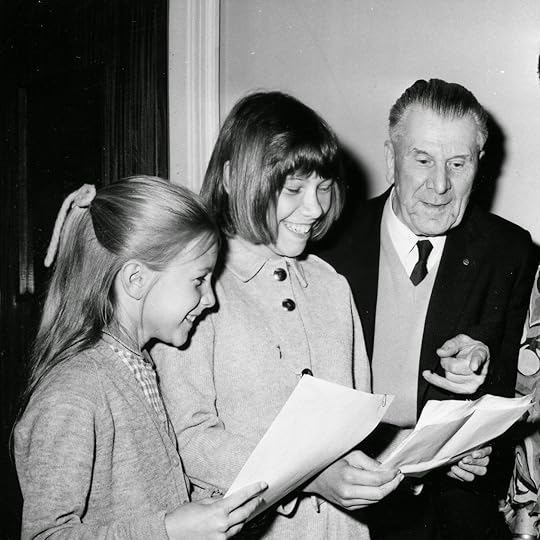
For my magic realism review blog I recently read and reviewed Larque On The Wing by Nancy Springer. In it a middle-aged woman is forced to confront her 10-year old self. The child reminds the woman of the early dreams and aspirations that she has abandoned. It made me think what that girl in the centre of the photo above would have thought of the adult me. That Zoe was confident in her ability as a poet with reason. By the time I was 13 I had been published and was getting noticed. I had no fear about what I wrote, no self doubts. I took the plaudits without embarrassment or question. When the Director of the Cheltenham Literature Festival told me that Philip Larkin, no less, had said I was the best young poet in Britain, I was pleased but not surprised. I didn't realize what a big deal it was and made no effort to get that in writing. How many times have I regretted that since!
What happened? Well - life in many ways. My gift was too easy, too natural. It came and went without my being in control. I can go for years without writing a poem and trying to force it just doesn't seem to work. I have intermittently written several major pieces of poetry in a flurry of white-hot words, sufficient to make a body of work, but there are long periods of non-production. These periods were filled with career, motherhood and all the other joyous demands on my attention. But shouldn't I also be doing something about placing my poetry in the public domain?
Two years ago I had a serious and life-threatening health emergency. I had always thought that I had time to promote my work, but as I lay in the hospital bed hitched to a monitor it was pretty clear that that was a false assumption. I published one of my long poems for voices - Fool's Paradise - as an ebook with Amazon and won the EPIC (Electronic Publishing Industry Coalition) award for best poetry book in 2013, but it isn't getting to the readership I would like.
As a poet I am very aware that even the books of the most successful poets have limited print-runs, so effectively giving away my work doesn't worry me. But what must I do to reach out and make my audience aware of my presence? It means going public, of marketing, of pushing my work and that does not come easily. How I wish I had that young girl beside me, to give me the confidence and the necessary chutzpah I find I am so lacking now. Ironically it is not that I doubt the quality of what I have written, I have never lost that inner belief. It is the translation of that into some public action that is so difficult. So here is a New Year Resolution - I will get off my insecure butt and face this. I am not yet sure how, but I will do something.
Published on December 30, 2014 11:59
November 24, 2014
First-Person Narrative Some Issues

"Reader, I married him."
One of my favourite books and certainly one of the most influential on me as a writer is Jane Eyre by Charlotte Bronte. I loved that book as a teenager and I still do. The narrator of the book is Jane herself and she speaks directly to me and the millions of Bronte's fans. There is something wonderful about the way the character engages us in her story: it is as if Jane is in the room with us. She is as honest a narrator as she is a character and you are immediately on her side. That immediacy is one of the strengths of first-person narration. But there are downsides, as I discovered when I wrote my trilogy The Healer's Shadow.
I soon discovered that not all readers are fans of first-person narration. One reviewer told me categorically that she didn't like first-person narration because there is no suspense - you know that the hero/heroine survives to the end of the book. Actually that isn't always true, but I can understand where she is coming from.
I also discovered that not everyone understands some of the devices and rules of first-person narration. One criticism my book Girl in the Glass has occasionally received is that the tense sometimes changes to the present, even though the majority of the book is written in the past tense. This happens when the central character is talking about an incident which is particularly vivid to her. This is acceptable in a first-person narrative, because the narration is reflecting what happens in real speech. When we start to relive the past, we will often start talking in the present tense. I could play safe and not shift tenses, but I feel that loses something.
I was reminded of the problems of first-person narration recently because I was reading a lovely book also written in the first person - When Rosa Came Home by Karen Wyld. The problem first-person narration gives a writer is that you can't jump out of the head of the narrator and into someone else's, which means that the story is filtered by what the narrator can see and know. At the macro level this means either the narrator has to see what happens or be told it by someone else who has seen it. Some readers (and reviewers) believe that a good book explains everything at the end - they want to understand the motivation of all the main characters, they want to know what happened to so-and-so who leaves the narrator's world at the end of part one. If you are using a first-person narrator you will either disappoint them or create a narrator whose omniscience is not credible. Be honest - do you understand your own motivation, let alone anyone else's?
Of course there is an upside to this problem and that is the games you can play with your narrator misinterpreting other characters and circumstances: an unreliable narrator as they say in the trade. It does seem to me that all narrators should be unreliable (to varying degrees) if they are human beings. My central character regularly gets things wrong and part of her character arc over the trilogy is how she comes to realize how wrong she has been.
On the micro level there are certain things that I have learned to look out for when I am going over my books. The most obvious of these are descriptions of things that are not visible to the narrator. These can be quite minor, but I find they can jolt me out of the first-person narrator's consciousness. Another issue I try to tackle is the overuse of phrases such as "I saw", "I heard" "I tasted" etc. In a way they are redundant in the first person - of course I saw it, I wouldn't be describing it otherwise. There is a very real danger that you will overuse the word "I" in first-person narration, which is just as off-putting in a novel as when you are listening to someone. First-person narration's very strength - its immediacy - can be negated by the overuse of the word.
First-person narration is a minefield for the writer. As I have outlined above, you will alienate some of readers just by using it, and others you will upset because of the limitations of the first-person narrative. There are even some agents who refuse to accept manuscripts written in the first person, but then some of the most successful books ever written recently and in the past have had a first-person narrator.
Published on November 24, 2014 13:29
August 6, 2014
What Magic Realism Means to Me
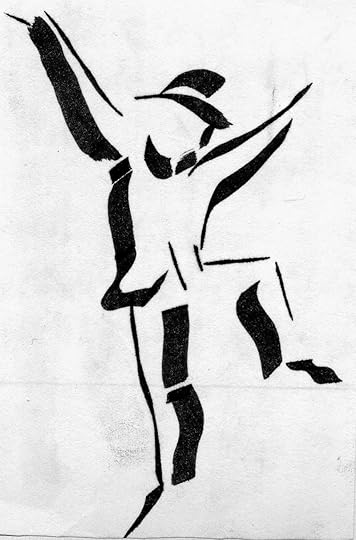
I am running a magic realism bloghop again this year. Some twenty blogs are signed up to take part and if last year's bloghop is anything to go by, there will be some fascinating posts.
Over on the Magic Realism Books blog I have scheduled posts about magic realist fiction available free from the web, about useful magic realism resources and a review of Bulgakov's Master and Margarita, which features on all the magic realism lists as one of the most important magic realist books ever written and is one of my all-time favourite books. Despite having written three posts for my other blog I want to write a more personal post here on my personal blog about what magic realism means to me.
Of course there is good and bad magic realism, magic realist books that last for ever in your mind and others that are easily forgotten. But as a general rule I find that the magic realist approach to portraying the world is one that I respond to and I recognize that it reflects my own experience. That is not to say that I have seen people ascend to heaven, been followed by crowds of butterflies when I fell in love or watched a relative turn into an item of furniture. But rather that I believe in allegory and metaphor, in imagery, in archetypes and in a heightened awareness that extends beyond "physical" reality.
For me, realism is overestimated. It excludes the profound. It does not allow my soul to soar. Nor does it take me to the depths beyond pain. I am and have always been a poet and a bit of a mystic. For a while, as a student, I neglected that side of my personality in favour of the rational and the academic. I stopped writing. It didn't last. The subconscious has a way of hitting back and my health suffered. Unable to think straight because of the pain, my reason dropped away and I was left with only instinct and intuition to fall back on - magic one might say. The poetry came flooding back. Here is part of the concluding section of a long poem I wrote at that time:
With pain falls silence.Words fail reason,Take on the form of danceOn unseen feet to unseen rhythms.The silence of snowFalls crystalline, smoothing out edges,Curving the landscape into circles -Roundel and bergomask.But these dancers do not beat sticks,Wear bells on ankles, shout "Hoy"Or bow, kiss fingersAnd place hands on whale-boned waists.This is an older dance.Its steps are preconditionedBy greater things than reason.We return to an earlier silence,A silence that is in the centre Of the hurricane.We return to the windThat has rung hollow in our bonesAnd gone unheededLike the calling of ghosts.
Published on August 06, 2014 00:00
July 28, 2014
The Cover as Writing Aid
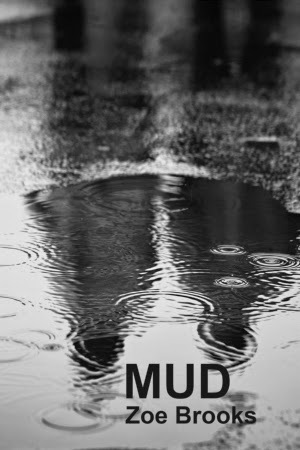
I find that working on the cover image of my book helps me work on the text itself. Right now I need clarify my feelings about the book.
The book's working name is Mud and it is set in modern Prague. At first I was playing with classic images of Prague - Charles Bridge and moody spires, but they didn't feel right. For starters the story isn't set in tourist Prague, but in the lovely but less well-known area of Holesovice. But I didn't want to identify that area particularly.
One of the reasons for playing with the cover is that it helps me identify my audience and genre. For many writers that is easy, but I write magic realism which isn't easy to slot into genres and can appeal to a range of audiences. The book is partly a psychological mystery (a main character is a Czech detective) and partly paranormal (the book touches on the Golem legend). I searched for books of these genres with a reference to Prague and got a load of books with moody spires or darkened streets. Maybe I should copy them - if it works... But I don't want to.
I wanted a moody picture but not a conventional one. So I wrote down the key elements of the book. They were:
the extreme storms and floods of 2013,the Golem Praguemissing femalemale detective.Then I searched for photos on 123rf.com which had combinations of the above phrases. It didn't work until I used the word "rain" and "Prague". That generated a photo by Czech photographer, Jaromír Chalabala. I clicked on his name and there was this photo:
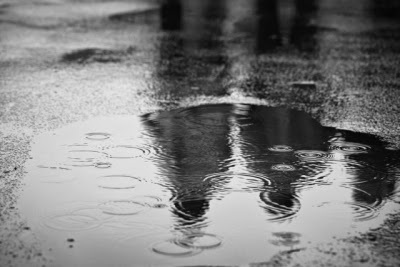
It was just what I was looking for. There's even a hint of a Golem in those reflections, don't you think?
Now all I've got to do is finish writing the book!
Published on July 28, 2014 15:43
May 13, 2014
Write What You Know
"Write what you know" is a piece of advice to new writers that can be very inhibiting. What do we know? If writers restrict themselves to writing about their experience, we would have a lot of boring books about humdrum lives. Whole genres would not exist: fantasy, science fiction, paranormal. But there is a grain of truth in the saying, we should write what is real even if what we write is fantasy. So how do writers do that? This is a question that fascinates me.
In some cases the answer is obvious: Tolkien may have been living the quiet life of an academic in Oxford, but he was a world expert on Anglo Saxon and Norse mythology. However the Lord of the Rings is more than a rehash of old stories. The book is seen through the eyes of the hobbits. Their tale is profoundly influenced by Tolkien’s experience as a young officer in the trenches of World War I. The hobbits are the British regular soldiers whom Tolkien had led over the top into the Mordor-like landscape of no-man’s land and whose stoicism and good humour he so admired. They bring a sense of reality to the book.
Most writers do not have such rich personal sources on which to draw. But we do have the reality of our fantasies, which can take reality and spin it into something much larger. The Bronte sisters’ novels are a good example of this.
I have three main sources of inspiration for my novels. Mother of Wolves was a historical fantasy novel, so clearly history is a massive source of material for me. It is a source for every writer if they choose to mine it. History gives an almost unlimited range of themes, settings and storylines. For Mother of Wolves I drew on the history of the persecution of the romanies (gypsies) in Europe. I discovered that in the 18thcentury they were hunted as if they were vermin by men with dogs and guns. Such a hunt features in my book. The central character is a woman who rises to be a gypsy queen, so I used the examples of great women leaders, such as Boudica and Elizabeth I, to help me understand what it takes to be such a woman. As these women are extraordinary, I could never hope to meet one in person.
The second source is the landscapes, towns and peoples of the world. Travel can be a great aid to the writer, but it is also possible to use the landscapes of one’s homeland and elaborate them. In my magic realism book Girl in the Glass I created a fictional city. The city is a large port set on several hills and on one hill stands a university which lives in an uneasy relationship with the rest of the city. I have been asked which city it is based on, it seemed so real to the reader. The answer is that it is several cities combined: Istanbul, Oxford, Victorian London to name three. In Mother of WolvesI came closer to home and set the story along a fictional river, which was based on an enlarged River Severn and the history of the people along its banks.
The third source is my personal experience and those of people I have met. I have been blessed with a loving family, a life untroubled by war, disease or other misfortune, but for about twenty years I worked with people on the margins of society. I am able to draw from their stories of fleeing their homes and countries, of persecution, of homelessness. I’d like to think that I don’t just use them, but I am a writer and writers will find inspiration everywhere.
So should a writer follow the advice "Write what you know"? If we read, study, travel and listen, what we "know" is only limited by our capacity to understand.
In some cases the answer is obvious: Tolkien may have been living the quiet life of an academic in Oxford, but he was a world expert on Anglo Saxon and Norse mythology. However the Lord of the Rings is more than a rehash of old stories. The book is seen through the eyes of the hobbits. Their tale is profoundly influenced by Tolkien’s experience as a young officer in the trenches of World War I. The hobbits are the British regular soldiers whom Tolkien had led over the top into the Mordor-like landscape of no-man’s land and whose stoicism and good humour he so admired. They bring a sense of reality to the book.
Most writers do not have such rich personal sources on which to draw. But we do have the reality of our fantasies, which can take reality and spin it into something much larger. The Bronte sisters’ novels are a good example of this.
I have three main sources of inspiration for my novels. Mother of Wolves was a historical fantasy novel, so clearly history is a massive source of material for me. It is a source for every writer if they choose to mine it. History gives an almost unlimited range of themes, settings and storylines. For Mother of Wolves I drew on the history of the persecution of the romanies (gypsies) in Europe. I discovered that in the 18thcentury they were hunted as if they were vermin by men with dogs and guns. Such a hunt features in my book. The central character is a woman who rises to be a gypsy queen, so I used the examples of great women leaders, such as Boudica and Elizabeth I, to help me understand what it takes to be such a woman. As these women are extraordinary, I could never hope to meet one in person.
The second source is the landscapes, towns and peoples of the world. Travel can be a great aid to the writer, but it is also possible to use the landscapes of one’s homeland and elaborate them. In my magic realism book Girl in the Glass I created a fictional city. The city is a large port set on several hills and on one hill stands a university which lives in an uneasy relationship with the rest of the city. I have been asked which city it is based on, it seemed so real to the reader. The answer is that it is several cities combined: Istanbul, Oxford, Victorian London to name three. In Mother of WolvesI came closer to home and set the story along a fictional river, which was based on an enlarged River Severn and the history of the people along its banks.
The third source is my personal experience and those of people I have met. I have been blessed with a loving family, a life untroubled by war, disease or other misfortune, but for about twenty years I worked with people on the margins of society. I am able to draw from their stories of fleeing their homes and countries, of persecution, of homelessness. I’d like to think that I don’t just use them, but I am a writer and writers will find inspiration everywhere.
So should a writer follow the advice "Write what you know"? If we read, study, travel and listen, what we "know" is only limited by our capacity to understand.
Published on May 13, 2014 14:08
February 17, 2014
hearth/myth: Guest Post - Zoe Brooks
I have written a post for Lynne Cantwell's Hearth/Myth blog which went live today. Lynne is fellow fan of magic realism and a member of the Magic Realism Books Facebook site. But my post is about how I came to have a writing retreat here in the Czech Republic. Click the link below to go to the site and read the whole post
hearth/myth: Guest Post - Zoe Brooks: Alert readers of hearth/myth know that I don't turn this space over to just anybody, and today is no exception. I'm very pleased to ...
hearth/myth: Guest Post - Zoe Brooks: Alert readers of hearth/myth know that I don't turn this space over to just anybody, and today is no exception. I'm very pleased to ...
Published on February 17, 2014 09:04
February 13, 2014
Free Days - the results
The Kindle Select promo is now over and I can begin to consider the results.
Girl in the Glass, the first book in The Healer's Shadow Trilogy, was free for three days Monday 3rd - Wednesday 5th February. My main paid publicity was on Freebooksy, a site which in the past has been good for me.
Contrary to what other authors have found, the figures for the giveaway compare well with ones I did last year. I had over 6000 downloads on amazon.com and 242 on other amazon sites. This tells me that I need to look at ways of marketing in the other markets, especially in the UK where previously I have done nearly as well as in the US. But it mostly tells me that Kindle free is still shifting copies. The book got to 53 in top free kindle books. It was just outside 100 on day 1, in the 80s on day 2 and 53 on day 3. Maybe it would have gone higher if the book had been free for two more days, but I will never know. Listing in the top 100 always results in extra momentum in downloads because your book appears on Amazon's top sales page.
Now for the important consideration: did it result in extra sales? Yes, there has been a bump: over 100 extra sales in the week since the promotion, so the cost of advertising has been more than covered and I am now into profit. Most of the sales have been of the other two books in the trilogy
The downside is that I got one snarky review albeit a 3 star one. This review referred to the book as "faux memoir", which I presume means that it is written in the first person. It also suggests that there are words missed out and strange punctuation. The book was edited by a professional editor with many years' experience, who suggests that what the reviewer is objecting to is the way the voice of the narrator is portrayed on the page. Oh well, what can I do about it? Not a lot. It's a shame if the review makes potential buyers think that the book has not been edited. But hey ho.
So will I be abandoning kindle select, as I suggested in my last post? I'm not sure. I suppose the best thing to do is to wait a while and then run a 99p promotion as a comparison.
Girl in the Glass, the first book in The Healer's Shadow Trilogy, was free for three days Monday 3rd - Wednesday 5th February. My main paid publicity was on Freebooksy, a site which in the past has been good for me.
Contrary to what other authors have found, the figures for the giveaway compare well with ones I did last year. I had over 6000 downloads on amazon.com and 242 on other amazon sites. This tells me that I need to look at ways of marketing in the other markets, especially in the UK where previously I have done nearly as well as in the US. But it mostly tells me that Kindle free is still shifting copies. The book got to 53 in top free kindle books. It was just outside 100 on day 1, in the 80s on day 2 and 53 on day 3. Maybe it would have gone higher if the book had been free for two more days, but I will never know. Listing in the top 100 always results in extra momentum in downloads because your book appears on Amazon's top sales page.
Now for the important consideration: did it result in extra sales? Yes, there has been a bump: over 100 extra sales in the week since the promotion, so the cost of advertising has been more than covered and I am now into profit. Most of the sales have been of the other two books in the trilogy
The downside is that I got one snarky review albeit a 3 star one. This review referred to the book as "faux memoir", which I presume means that it is written in the first person. It also suggests that there are words missed out and strange punctuation. The book was edited by a professional editor with many years' experience, who suggests that what the reviewer is objecting to is the way the voice of the narrator is portrayed on the page. Oh well, what can I do about it? Not a lot. It's a shame if the review makes potential buyers think that the book has not been edited. But hey ho.
So will I be abandoning kindle select, as I suggested in my last post? I'm not sure. I suppose the best thing to do is to wait a while and then run a 99p promotion as a comparison.
Published on February 13, 2014 06:10
February 3, 2014
Free or reduced Girl in the Glass
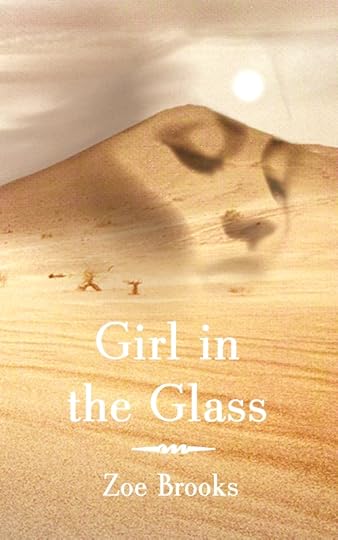
Girl in the Glass is currently free on Amazon until Wednesday as a KDP Select promotion, but this may be the last time I use the KDP free option. Now that all three books in The Healer's Shadow are out as kindle books, I am revisiting my promotional strategy.
Previously I gave up on distributing Girl in the Glass through Smashwords for the simple reason it wasn't working for me. My sales were so low through Kobo, Nook and Smashwords that they barely registered, so Amazon's offer of free days via KDP Select in return for exclusivity looked worth considering. For a while all five of my books were listed with KDP Select. Certainly for a time the sales boost that took place after the free promos, especially those for the books in the trilogy, made it worthwhile sticking with Amazon.
But is that still the case? My observation has been that the sales boost is not so great and probably not worth the few inevitable reviews one gets from people who download every free book going and then complain about yours not being in a genre they like! There are several issues here:
people don't necessarily value anything that is free, people (myself included) tend to read books they paid for firstAmazon has changed the metrics so free books doesn't feature so highly in their charts.people are suspicious of free books, as sadly some badly written indie freebies have queered the pitch for the rest of us. So what am I to do instead?
I follow several blogs for indie writers and am a member of several writers groups on Facebook. On these I have increasingly seen a debate as to whether 99 cents is the "new free".
Last year Amazon changed how it paid associate sites (sites which advertise Amazon books), as a result it became less viable for sites to earn money from books going free on Amazon. The change meant that sites which writers used to promote free books had to charge for advertising freebies. Those sites which resulted in a sufficient boost in downloads and an equivalent post-free boost in sales are now either over-subscribed or charging a lot more money. Many of the others have simply closed down. Plus of course the change to Amazon's metrics makes actually getting a return on your advertising costs even harder.
The other consequence of the change in both Amazon's metrics and payment of associates is that suddenly reduced-price sales make a lot more sense. More associate sites are offering reduced-price listings (especially 99 cents lists) alongside or instead of freebie ones. And you do at least get 35% of 99 cents rather than 35% of nothing. I'm not sure that psychologically purchasers will value a 99 cent book much higher than a free one, but there might be a slight difference.
So I am reconsidering my position. One advantage with coming off free and KDP Select is that I will be able to publish the books on other platforms and through other vendors. I don't like having all my literary eggs in one basket, but up to now KDP Select promos were pretty much the only show in town that worked for me. I am particularly keen to publish on Kobo as that is the e-reader sold by WH Smith, and so is the main rival in my native UK to Kindle and I want all my friends with e-readers to be able to read my books. Neverthless Kindle massively exceeds Kobo sales here, but then I understand that this is not the case all over the world. And then there are the developments at Scribd around ebook lending, which are really interesting, but they will have to wait for another post.
In the meantime Girl in the Glass is free on http://www.amazon.com/dp/B007IROBEE and on http://www.amazon.co.uk/dp/B007IROBEE.
Get it while you can, this may be the last time it goes free.
Published on February 03, 2014 07:35



